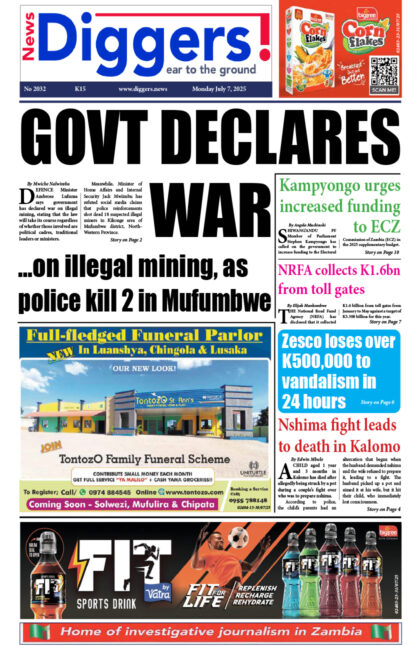Adjacent to our office building is a shop run by Zambian brothers of Asian origin. In the past four years, this relatively small supermarket has witnessed a drop in human traffic owing to the malls engulfing our territory. I realise that these malls are no better than intruders cannibalising the market at the expense of smaller and here-to-stay businesses.
One thing I admire about the entrepreneurs next door is their resilience. These are well groomed entrepreneurs whose business philosophy appears to be ‘every ngwee that comes in is money’. They know that the power of enterprise is organic growth. The business should be well rooted and solid enough to keep growing even under intense competition. These entrepreneurs have defied the current business model taking shape in Zambia, which my colleague and workmate, Wilfred Sakala calls, ‘Dump and Collect’ enterprises.
Depending on where you are sitting or the kind of business you are operating, business is very slow. Quality contracts are not forthcoming. Customers are not as many as before. You may say it is a result of economic problems. In part yes, but not completely.
Despite issues surrounding the country’s debt and slow growth in GDP, the reality is that there is enough money to go round. What may not be working well now is that there are more people competing for limited business opportunities. Those in the construction sector who used to compete among themselves are now fighting with the Chinese.
When I saw that the Catholic Church in Chelstone is being rebuilt using a Chinese firm, I knew immediately business is hard for Zambian contractors. The Catholic Church, in my opinion, is the last organisation that would give business to a foreign entity, let alone Chinese. However, given that almost every organisation is focused on cost-saving and speedy execution of projects, I can only guess the church leadership had no option but to go Chinese route at the expense of their own members in the construction business.
Almost every enterprise is fighting for business. Insurance companies, banks, consulting firms, auditing firms, schools, hospitals and private clinics and several other businesses are realising clients are not as many as before. Even shopping malls expanding each day we wake up are finding it hard to find clients to occupy the spaces. Some of the supermarkets that once experienced long queues of shoppers now have queues of till attendants.
Here is the bad news: This experience is permanent. It is not only unique to Zambia but elsewhere. The larger the number of players in the market, big and small, the narrower it becomes to enjoy high business volumes. There no longer exists monopolies. Another person offers what you are selling. Your first reaction to what is happening is to know that your territory has been invaded, someone disturbing your comfort zone and its time to do something.
Your first reaction to intense competition is to protect your territory. Two weeks ago, I wrote about the value of protecting your one client. Do not take lightly those few customers who are loyal to you. Do everything possible to keep them. Think of many women who are on guard to protect their marriages against the menacing young attractive women. Competitive conditions call for protectionist strategies.
Here is another tactic you should employ when business is slow because of intense competition: Differentiate your business from the rest. In marketing terms they call it value proposition. Always bear in mind, there is no business that is like the other. Businesses can operate in the same market, offer similar products but still be different just like fingerprints are different from every other person.
Since last year, I have had some work with Professional Insurance Corporation of Zambia PLC (PICZ). I quickly established that though it operates under a cluster of many other insurance companies, it has a unique brand that distinguishes it from the others. I was keen to know what made it different because I spent nearly eight years trying to cripple this company at the time I worked for ZSIC.
One of the main secrets behind PICZ’s competitive edge is lead time. In short, you can be in the same market, offer the same product, at the same price but one player edges out the other on response rate to enquiries and service delivery (time it takes to underwrite the asset and how long it takes to settle a claim).
It is not the big things we do in our business that set us apart from competition. Interesting, at Bridges Limited, we do not consider those that offer our products as competitors. We collaborate with them and have made significant business inroads working together with those who would ordinarily be competitors. Developing business synergies could be another tactic in leveraging a saturated market environment. This, however, requires a win-win mindset.
The quality of attention, the responsiveness of your employees, the attention to customer care and cleanliness of the environment (now with the advent of cholera) can shift business from the others to you. What is your business footprint and how does it help you win clients?
Will be happy to hear from you. [email protected]



















